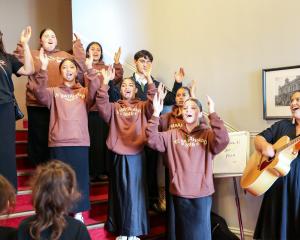About 400 people did not forget those who served in World War 1, turning out yesterday for a mid-morning service in Oamaru commemorating 100 years since the war was declared in 1914.
The service, led by Oamaru parish Catholic priest Father Wayne Healey, was in front of the World War 1 monument, with two lanes of lower Thames St closed to accommodate the crowd.
In the tradition of Anzac Day services at the monument since it was unveiled on April 25, 1926, there were wreaths laid, prayers, hymns and speeches about the sacrifice of New Zealand and North Otago men and women who had embarked ''on a great adventure'', as a number of speakers termed it, that turned into ''a great loss of young people''.
Flanked by North Otago Returned and Services Association members, New Zealand flag-bearer Ian Kofoed and British flag-bearer Wayne MacRitchie, the monument was the focal point of the start of four years of commemoration in the district marking major events in World War 1.
The No 26 (Oamaru) Squadron, RSA members and representatives from the three Oamaru secondary schools, police, fire service, St John and other organisations, along with young and old, heard Fr Healey describe yesterday as ''a day of deep solemnity''.
Waitaki MP Jacqui Dean graphically described the day after New Zealand joined Britain after it declared war at midnight, and the effect that news had, when it spread to New Zealand on August 5, 1914.
Young men joined up believing they were doing the right thing and expecting they would be home by Christmas.
But the war dragged on for four years, taking a huge toll on a country with a population then of only one million - more than 100,000 men and women served, 18,550 died and 41,000 were wounded, some of whom died after returning home.
''It is for those we gather today - all we can do in offer prayers and respectfully thank them for their efforts and sacrifices,'' she said.
RSA national vice-president and Upper Waitaki branch president Michael Blackstock said World War 1 changed New Zealand forever.
There was a ''certain air of romance and chivalry'' about going to war, but that changed as the war dragged on .
New Zealanders left with the feeling of ''hope and promise'' that the war would be over quickly.
''How wrong they were,'' he said.














